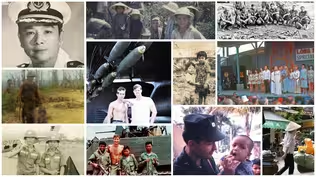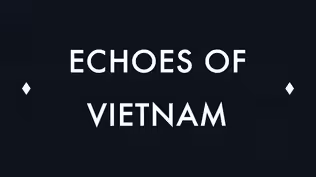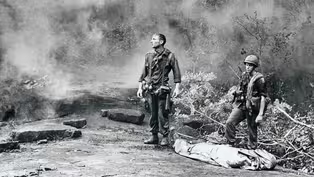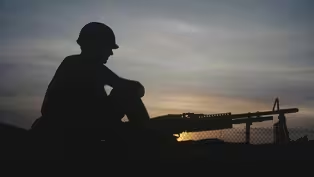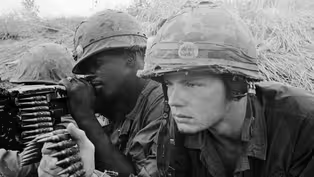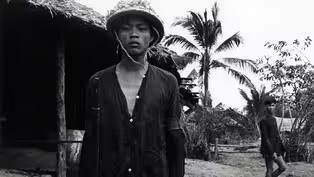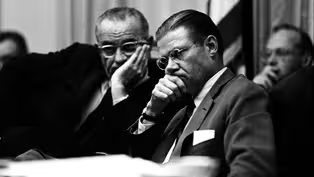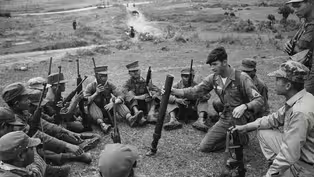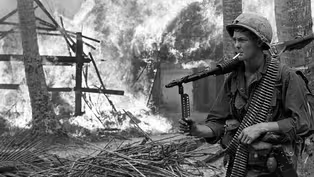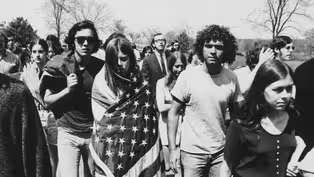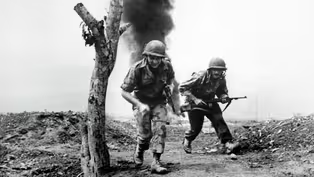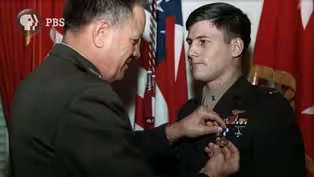
A Disrespectful Loyalty (May 1970-March 1973)
Episode 9 | 1h 52m 32sVideo has Audio Description
South Vietnam fights alone as Nixon and Kissinger find a way out for America. POWs return.
South Vietnamese forces fighting on their own in Laos suffer a terrible defeat. Massive U.S. airpower makes the difference in halting an unprecedented North Vietnamese offensive. After being re-elected in a landslide, Nixon announces Hanoi has agreed to a peace deal. American prisoners of war will finally come home – to a bitterly divided country.
See all videos with Audio DescriptionADProblems playing video? | Closed Captioning Feedback
Problems playing video? | Closed Captioning Feedback
Funding for The Vietnam War is provided by Bank of America; Corporation for Public Broadcasting; David H. Koch; The Blavatnik Family Foundation; Park Foundation; The Arthur Vining Davis Foundations; The...

A Disrespectful Loyalty (May 1970-March 1973)
Episode 9 | 1h 52m 32sVideo has Audio Description
South Vietnamese forces fighting on their own in Laos suffer a terrible defeat. Massive U.S. airpower makes the difference in halting an unprecedented North Vietnamese offensive. After being re-elected in a landslide, Nixon announces Hanoi has agreed to a peace deal. American prisoners of war will finally come home – to a bitterly divided country.
See all videos with Audio DescriptionADProblems playing video? | Closed Captioning Feedback
How to Watch The Vietnam War
The Vietnam War is available to stream on pbs.org and the free PBS App, available on iPhone, Apple TV, Android TV, Android smartphones, Amazon Fire TV, Amazon Fire Tablet, Roku, Samsung Smart TV, and Vizio.
Buy Now
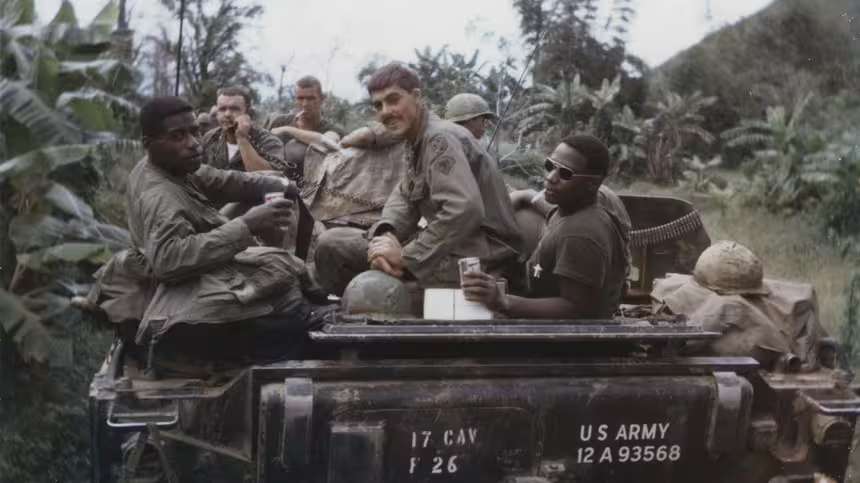
Vietnam Stories
We asked viewers to share their experiences during the events of the Vietnam War era. The response was thousands of videos, photographs, and short stories.Providing Support for PBS.org
Learn Moreabout PBS online sponsorshipMore from This Collection
These episodes feature audio tracks containing English, Spanish and Descriptive Audio.
The Weight of Memory (March 1973-Onward)
Video has Audio Description
Saigon falls and the war ends. Americans & Vietnamese from all sides seek reconciliation. (1h 50m 56s)
The Veneer of Civilization (June 1968-May 1969)
Video has Audio Description
After chaos roils the Democratic Convention, Nixon, promising peace, wins the presidency. (1h 50m 54s)
This Is What We Do (July 1967-December 1967)
Video has Audio Description
President Johnson escalates the war while promising the public that victory is in sight. (1h 28m 17s)
Things Fall Apart (January 1968-July 1968)
Video has Audio Description
Shaken by the Tet Offensive, assassinations and unrest, America seems to be coming apart. (1h 27m 46s)
The River Styx (January 1964-December 1965)
Video has Audio Description
With South Vietnam near collapse, LBJ bombs the North and sends US troops to the South. (1h 57m 55s)
Video has Audio Description
As a communist insurgency gains strength, JFK wrestles with US involvement in Vietnam. (1h 26m 27s)
Resolve (January 1966-June 1967)
Video has Audio Description
US soldiers discover Vietnam is unlike their fathers’ war, as the antiwar movement grows. (1h 57m 25s)
The History of the World (April 1969-May 1970)
Video has Audio Description
Nixon withdraws troops but upon sending forces to Cambodia the antiwar movement reignites. (1h 52m 9s)
Video has Audio Description
After a century of French occupation, Vietnam emerges independent but divided. (1h 25m 20s)
Providing Support for PBS.org
Learn Moreabout PBS online sponsorshipANNOUNCER: MAJOR SUPPORT FOR "THE VIETNAM WAR" WAS PROVIDED BY MEMBERS OF THE BETTER ANGELS SOCIETY, INCLUDING JONATHAN AND JEANNIE LAVINE, DIANE AND HAL BRIERLEY, AMY AND DAVID ABRAMS, JOHN AND CATHERINE DEBS, THE FULLERTON FAMILY CHARITABLE FUND, THE MONTRONE FAMILY, LYNDA AND STEWART RESNICK, THE PERRY AND DONNA GOLKIN FAMILY FOUNDATION, THE LYNCH FOUNDATION, THE ROGER AND ROSEMARY ENRICO FOUNDATION, AND BY THESE ADDITIONAL FUNDERS.
MAJOR FUNDING WAS ALSO PROVIDED BY DAVID H. KOCH...
THE BLAVATNIK FAMILY FOUNDATION...
THE PARK FOUNDATION, THE NATIONAL ENDOWMENT FOR THE HUMANITIES, THE PEW CHARITABLE TRUSTS, THE JOHN S. AND JAMES L. KNIGHT FOUNDATION, THE ANDREW W. MELLON FOUNDATION, THE ARTHUR VINING DAVIS FOUNDATIONS, THE FORD FOUNDATION JUSTFILMS, BY THE CORPORATION FOR PUBLIC BROADCASTING, AND BY VIEWERS LIKE YOU.
THANK YOU.
Announcer: Can looking back push us forward?
Man: Ladies and gentlemen, Miss Billie Holiday.
♪ Will our voice be heard through time?
Can our past inspire our future?
...act of concern... ♪ Bank of America supports filmmakers like Ken Burns, whose narratives illuminate new perspectives.
What would you like the power to do?
Bank of America.
CROWD (chanting): No more war!
No more war!
No more war!
No more war!
No more war!
No more war!
("Get Together" by the Youngbloods playing) No more war!
No more war!
No more war!
No more war!
No more war!
CROWD (chanting): U.S.A.!
U.S.A.!
U.S.A.!
U.S.A.!
YOUNGBLOODS: ♪ Love is but a song to sing ♪ ♪ Fear's the way we die ♪ (crowds shouting, clamoring) ♪ You can make the mountains ring ♪ ♪ Or make the angels cry ♪ (shouting continues) ♪ Come on, people, now ♪ ♪ Smile on your brother ♪ ♪ Everybody get together ♪ ♪ Try to love one another right now ♪ KARL MARLANTES: My brother picked me up at Travis Air Force Base.
And I remember he had a Valiant, an old beat-up Valiant.
And we met inside the terminal.
And I was so happy to see him.
I just love my brother.
(crowd shouting in distance) He said, "Now, I don't want you to get upset, "but we're probably gonna get some trouble when we go outside."
And I went, "Trouble?
I just got back from Vietnam.
What are you talking about?"
I mean, I knew that there was unrest.
YOUNGBLOODS: ♪ If you hear the song I sing ♪ MARLANTES: But when we got in his car to drive away from the terminal, we had to wind our way through protesters that were pounding on the car with the ends of their signs and were snarling at me and pounding on the window and shouting obscenities at me.
That was my welcome home to America.
(shouting continues) I was just stunned.
YOUNGBLOODS: ♪ Come on, people, now ♪ I have never felt... any anger toward people that were war protesters.
It's a legitimate political stance.
For people that descended into that, I... I-I think that they were really wrong.
YOUNGBLOODS: ♪ Try to love one another right now ♪ It was this-this heartbreak of why are you doing this?
I mean, you don't know who I am.
And it happened over and over.
YOUNGBLOODS: ♪ Everybody get together ♪ ♪ Try to love one another right now ♪ ♪ Right now ♪ ♪ Right now.
♪ (siren wailing) NARRATOR: In the spring of 1970, despite the uproar over the invasion of Cambodia and the killing of four students at Kent State, President Nixon's hold on what he called "the great silent majority" seemed secure.
A Gallup poll showed that most Americans blamed the students, not the National Guardsmen, for what had happened.
(shouting, clamoring) At an antiwar demonstration in Manhattan, hundreds of construction workers in hard hats attacked protestors, sending 70 to the hospital.
And when workers marched on City Hall a few days later, Nixon wrote the president of their union to say how pleased he was "to see the tremendous outpouring "of support for our country demonstrated in your orderly and most heartening rally."
How do you feel about the construction workers who attacked the, uh, demonstrators last Friday?
Don't say attacked.
Don't say attacked.
They were provoked.
They were provoked, man.
We work for a living.
Every day we get up, we're out there in the cold, the rain, the snow, right?
We got to have these dirty s...
Forget about it, I don't want to talk about it, man.
Anybody that can take a Viet Cong flag and fly it and wave it and bring it up this avenue and get away with it-- and get away with it-- that's unpatriotic to me.
NARRATOR: When American troops withdrew from Cambodia at the end of June, the White House reported that they had killed 11,349 enemy troops, captured 22,000 weapons and had destroyed 11,688 bunkers and buildings.
But after so many years of fighting, more and more Americans were tired of the war, wanted to get out of Southeast Asia, and did not want the president to expand the conflict further.
Among their representatives in Congress, antiwar sentiment had steadily grown.
As the president searched for a face-saving way to end the war, he continued to withdraw troops.
CROWD (chanting): U.S.A.!
U.S.A.!
But even as American casualty figures fell, the gulf between Americans at home widened, tearing communities, neighborhoods, even families apart.
CROWD (chanting): No more war!
No more war!
Nixon was convinced-- just as Lyndon Johnson had been-- that the antiwar movement was somehow being directed from Hanoi, Beijing and Moscow.
"Within the iron gates of the White House a siege mentality was settling in," a Nixon aide remembered.
"It was now us against them.
"Gradually, as we drew the circle closer around us, the ranks of them began to swell."
(crowd chattering) PHIL GIOIA: I think the Vietnam War drove a stake right into the heart of America.
It polarized the country as it had probably never been polarized since before the Civil War.
And, unfortunately, we've never moved really far away from that.
And we never recovered.
CROWD: No more war!
No more war!
CROWD: U.S.A.!
U.S.A.!
U.S.A.!
CROWD: No more war!
No more war!
No more war!
No more war!
U.S.A.!
U.S.A.!
U.S.A.!
U.S.A.!
No more war!
No more war!
No more war!
No more war!
No more war!
(chanting stops) ♪ ♪ DAVID FROST: Thank you very much, indeed, and welcome to this, uh, special, very special edition of The David Frost Show.
The vice president himself wanted to debate with students, and we suggested a format in which he might like to do so.
Welcome Eva Jefferson from Northwestern, who testified before the Scranton Commission on Campus Unrest and is majoring in political science.
Is that right?
Right.
NARRATOR: Eva Jefferson, whose father had served in Vietnam, was now the student body president at Northwestern University.
After Kent State, she had forcefully stopped angry protestors from burning down the ROTC building at her school, and later testified before a presidential commission looking into the causes of student unrest.
She had warned then that some students were becoming so frustrated that they felt they had no choice but to engage in violence.
And right now it's a privilege to welcome the vice president of the United States, Spiro T. Agnew.
(audience applauding) AGNEW: Let me take brief exception to one thing you've said, that the only way to get the attention of the society is to bomb buildings.
What I attempted to do before the Scranton Committee was to explain what could motivate someone to blow up a building.
I did not say I endorse this, and if you read my testimony quite carefully, you'll know that I didn't.
And it's this type of-of just picking up on what, allegedly, I said instead of really studying what I said that-that really disturbs me.
(quietly): May I respond?
Because you're making people afraid of their own children.
Yet they're your children, they're my parents' children, they're the children of this country.
Yet you're making people afraid of them.
And I think this is the greatest disservice.
There's an honest difference of agreement on issues, but-but when you make people afraid of each other, you-you isolate people, and maybe this is your goal, but I think this is... this could only have a disastrous effect on the country.
(applause) Let me say first that isolating people is not my goal.
If that were true I wouldn't be here tonight.
And let me take exception to that oft-repeated rationale that, uh, violence is the only way to get results.
I was trying to explain to you the rationale of some students who are openly revolutionary.
You're not listening to what I'm saying.
I'm-I'm really distressed.
Just what are... what are you advocating?
EVA JEFFERSON PATERSON: They were trying to politically benefit from making us out to be these scary, horrible, violent people.
We weren't.
We were against the war.
We thought the war was wrong.
We thought we were lied to.
And we were in the streets.
America has always had a rich tradition of protests.
We were founded by protesting England.
So to make people afraid of their kids, I think, was wrong, but that's what they were about.
They were fearmongers.
BAO NINH: PHAN QUANG TUE: It was fratricide.
You can say, "Well, but-but they are communist."
Okay, they're communist.
"They are the worst Vietnamese in the entire world.
We were the good Vietnamese."
But let's face Vietnamese killing Vietnamese.
How-how do you deny that?
If you don't call that fratricide, what do you call that?
What do you... how do we...
I explain that to-to my children?
NARRATOR: The Cambodian incursion had at least temporarily reduced the flow of North Vietnamese men and supplies through that country, but they were still streaming down the Ho Chi Minh Trail in Laos.
The White House wanted them stopped.
But this time, South Vietnamese troops would have to try to do the job alone.
By the end of 1970, both houses of Congress had barred all U.S. ground personnel, even advisors and special forces, from crossing the border.
On February 8, 1971, 17,000 ARVN troops began moving into Laos to destroy the enemy's jungle bases and to cut off the Ho Chi Minh trail.
The Americans could only provide air support.
Nixon and his National Security Advisor, Henry Kissinger, believed that a successful operation would boost morale in Saigon and prove to Hanoi and the American public that the ARVN could fight and win on their own, that Vietnamization could work.
Their target was the North Vietnamese logistics hub, the abandoned town of Tchepone.
U.S. intelligence believed there were no more than 22,000 North Vietnamese troops in the area.
But there would eventually turn out to be 60,000, and their commanders knew there was only one route the ARVN was likely to take.
Harry Hue, who had been fighting the communists for eight years, was in the invasion force.
HUE (speaking English): (explosion) NARRATOR: Although individual ARVN units fought bravely, the invasion was a failure.
Almost half of the 17,000 South Vietnamese who entered Laos would be killed, wounded or captured.
HUE: BAO NINH: NARRATOR: In late March, as the surviving ARVN forces straggled back across the border into South Vietnam, crowds of weeping women, children and old men-- dressed in white, the color of mourning-- begged for news of the soldiers who were missing.
In Vietnam, the dead must receive proper burial so that their restless souls can have peace, and their families needed to know the time of their deaths so that they could honor them each year.
Even before the invasion was over, President Nixon had told an aide, "We must claim victory, whatever the outcome."
Consequently, tonight, I can report that Vietnamization has succeeded.
Because of the increased strength of the South Vietnamese, because of the success of the Cambodian operation, because of the achievements of the South Vietnamese operation in Laos, I am announcing an increase in the rate of American withdrawals.
We have it in our power to leave Vietnam in a way that offers a brave people a realistic hope of freedom.
We have it in our power to prove to our friends in the world that America's sense of responsibility remains the world's greatest single hope of peace.
And generations in the future will look back at this difficult, trying time in America's history, and they will be proud that we demonstrated that we had the courage and the character of a great people.
OPERATOR: Dr. Kissinger, sir.
NIXON: Yeah.
KISSINGER: Mr. President?
NIXON: Yeah.
Hi, Henry.
KISSINGER: This was the best speech you've delivered since you've been in office.
NIXON: Yeah.
I'll tell you one thing, this was, uh...
This little speech was a work of art.
I mean, I-I know a little something about speechwriting.
And it was no act, because no actor could do it.
No actor in Hollywood could have done that that well.
KISSINGER: It's the best... NIXON: I thought that was done well, didn't you think?
KISSINGER: First of all, no actor could have written it, to begin with.
You couldn't have done it unless you had meant it.
NIXON: Yeah.
And if it doesn't work, I don't care.
I mean, right now, if it doesn't work... Then let me say, though, I'm going to find out soon, and then I'm going to turn right so goddamn hard it'll make your head spin.
We'll bomb those bastards right out of the... off the earth.
I really mean it.
("We Gotta Get Out of This Place" by the Animals playing) ♪ In this dirty old part of the city ♪ ♪ Where the sun refuse to shine ♪ ♪ People tell me there ain't no use in trying ♪ Do you belong to the same generation that is protesting at home?
Do you feel as if you belong to those people?
Very much.
You do?
Very much.
I wish they'd get us out of here, I really do.
♪ We gotta get out of this place ♪ ♪ If it's the last thing we ever do ♪ ♪ We gotta get out of this place ♪ ♪ Girl, there's a better life ♪ JAMES GILLAM: Almost all of us were draftees.
None of us cared a damn about the war.
We just didn't want to get blown up.
We just didn't want to die in the jungle, holding your guts in.
So the idea is do six months, maybe eight months, get an R&R, take a deep breath and try to finish up, try to do something that would get you sent to base camp.
Just don't die because you're not gonna win.
ANIMALS: ♪ We gotta get out of this place ♪ ♪ If it's the last thing we ever do ♪ REPORTER: Chess is the most serious contest Glen Hindley will engage in, for he has not fired a shot in his nine months in the field with Charlie Company.
HINDLEY: Well, I haven't shot anybody yet.
I don't plan on it.
I haven't fired my gun since I been here, and I like it that way.
REPORTER: How can you get away with that?
Just don't fire it.
I plan to go across the... across country when I get back because I'll see the people I know over here, plus I'll be able to talk to a lot of other people, maybe convince them that killing for peace just doesn't make sense.
ANIMALS: ♪ We gotta get out of this place ♪ ♪ If it's the last thing we ever do ♪ ♪ We gotta get out of this place.
♪ NARRATOR: "The morale, discipline, and battleworthiness of the U.S. Armed Forces," a retired Marine colonel wrote in the spring of 1971, "are lower and worse than at any time, possibly in the history of the United States."
An official report had found that one out of four enlisted men in Vietnam had used marijuana regularly-- but almost never in combat.
SOLDIER: There's, uh, drugs everywhere.
Really, you could, uh... Well, within... within ten minutes in country, I-I had people approaching me selling scag.
INTERVIEWER: What's scag?
It's heroin.
NARRATOR: Heroin was cheap, pure, and everywhere.
The Pentagon would eventually acknowledge that 40,000 American troops had been addicted to it.
ANIMALS: ♪ We gotta get out of this place ♪ ♪ If it's the last thing we ever do ♪ ♪ We gotta get out of this place ♪ ♪ Girl, there's a better life ♪ (coughs) ♪ For me and you ♪ ♪ Ooh, baby ♪ "The rearguard of a once 500,000-man army," an officer wrote, "is numbly extricating itself from a nightmare war "the armed forces feel they had foisted on them "by bright civilians who are now back on campus writing books about the folly of it all."
Even General Creighton Abrams, commander of military operations in Vietnam, now admitted privately, "I need to get this army home to save it."
ANIMALS: ♪ I know it, too, baby ♪ ♪ Oh, yeah.
♪ The telegrams and letters coming into this courthouse are from all parts of the country.
From Baton Rouge, Louisiana, a man writes, "Congratulations to the Calley jurors.
"A courageous and fair decision.
Justice still exists."
NARRATOR: On March 29, 1971, at Fort Benning, Georgia, a military court found Lieutenant William Calley-- and only Lieutenant Calley-- guilty of murdering Vietnamese civilians at My Lai back in 1968.
He was sentenced to life imprisonment at hard labor.
The commander of Calley's division, General Samuel Koster, who had watched some of the slaughter from a helicopter and done nothing to stop it, was now the superintendent of the U.S. Military Academy at West Point.
He was forced to resign.
The other 23 officers and men who had been indicted were either acquitted or had their cases dismissed.
The Calley verdict proved as controversial as the war itself.
TROTTA: A lady in Cheyenne, Wyoming, says, "What the jury has done to Lieutenant Calley "is a disgrace to this nation.
"The enemy is the enemy, the enemy is the enemy."
From Bellefontaine, Ohio, a doctor says, "Let us not condemn Lieutenant Calley "when it is the character of the war which is at fault for such slaughters as My Lai."
What is your initial reaction to this verdict, sir?
I thought he would be found not guilty.
'Cause you send in a man into combat, you train him to be a... a killer, and then, when he does, why then, uh, you prosecute him?
NARRATOR: Some believed everyone involved should have gone to jail; others believed that Calley had been made a scapegoat for the criminal misdeeds of his superiors.
And still others felt a systemic failure of leadership had occurred in a chain of command that stretched all the way up to the commander in chief.
According to a Gallup poll, 79% of the American public disagreed with the verdict.
Nixon decided to intervene.
Calley spent just three days behind bars.
The president ordered him transferred from federal prison to house arrest at Fort Benning, pending appeal.
MAN: Okay, I'm gonna walk back from each side.
NARRATOR: Captain Aubrey Daniel, who had successfully prosecuted Calley, wrote Nixon, accusing him of compromising "such a fundamental moral principle "as the inherent unlawfulness of the murder of innocent persons."
A military appeals court eventually reduced Calley's term to 20 years, the secretary of the army cut it to ten, and after just three and a half years under house arrest, he was paroled.
TIM O'BRIEN: Who's responsible?
The human beings who did this...
These are war crimes.
The individual human beings who put a rifle muzzle up against a baby's head and shot the brains out of that baby-- nothing happened to them.
Nothing!
HAL KUSHNER: And we walked up the Ho Chi Minh Trail.
And they said we walked 900 kilometers-- 540 miles in 57 days.
And we met all these people going both ways.
We met civilians coming south.
We met soldiers going north and south.
We met people humping artillery rounds.
We met a...
I remember a whole unit, a company-size unit, of women.
On the way, in one of these villages, I stole a uniform.
Just khaki pants and khaki shirt.
And I stole it.
And I folded it up and I put it in my pack.
NARRATOR: By early 1971, army doctor Hal Kushner had been a prisoner of the Viet Cong in South Vietnam for more than three years.
He had survived ill treatment and a host of illnesses, and he had buried 13 of his fellow captives, who had died of starvation and sickness and despair.
Now, he and the other survivors from his camp were being moved all the way to North Vietnam.
Kushner and his companions eventually reached the city of Vinh, where they boarded a train to Hanoi.
KUSHNER: And I put on this fresh uniform, and when I got off the train I was met with this officer in a jeep.
And he just looked at me and he said, "You're an officer, aren't you?
You come here."
And he just...
I felt very proud that I looked good when I came off that train.
NARRATOR: Kushner joined hundreds of American captives who were scattered among five prisons in and around Hanoi.
KUSHNER: We hadn't been there long when the word came down from the American senior ranking officer that nobody would go home unless everybody went home.
That nobody would cooperate with the Vietnamese.
(indistinct voice on radio) But we heard him on the camp radio once... (radio transmission continuing) ...telling us that we should cooperate.
And it was obvious, from his voice and his inflection, that he had been tortured and beaten and was being made to say that.
And that's what they did.
NARRATOR: Eventually, Kushner, like most of the prisoners, would be forced to record a statement against the war.
(light clicks on) KUSHNER (on recording): KUSHNER: They wanted propaganda statements to say the war was criminal, to say that we were criminals.
And they used our weakness against us.
(light clicks off) ("Gimme Shelter" by the Rolling Stones playing) CROWD (chanting): No more war!
No more war!
No more war!
No more war!
No more war!
JOHN MUSGRAVE: The first time in our history that veterans came home from a war and said-- while the war is still going on-- and said, "This war's got to stop."
And the American people might not listen to a bunch of long-haired hippie kids.
What do they know?
But the working class, the great "silent majority"-- Richard Nixon always talked about his "silent majority" that would back him by being silent-- we were their kids.
And it finally dawned on me-- and this was a long, painful process-- that... that I wasn't helping anybody by keeping my mouth shut.
NARRATOR: Less than three weeks after Lieutenant Calley was found guilty, some 2,000 members of an organization called Vietnam Veterans Against the War and their followers descended upon Washington, D.C. MICK JAGGER: ♪ Ooh, storm is threatening ♪ ♪ My very life today ♪ ♪ If I don't get some shelter ♪ ♪ Oh, yeah, I'm gonna fade away ♪ ♪ War, children ♪ ♪ It's just a shot away ♪ ♪ It's just a shot away ♪ ♪ War, children ♪ ♪ It's just a shot away ♪ ♪ It's just a shot away.
♪ VVAW was a-a... it was great therapy.
We were working it out ourselves.
Vets taking care of vets.
We were generals in our own right.
And we didn't join anything.
We became something.
And that, yes, I was a Marine, but I was first and foremost a citizen of the United States of America.
And being a citizen, I had certain responsibilities.
And the largest of those responsibilities is standing up to your government and saying "no" when it's doing something that you think is not in this nation's best interest.
That is the most important job that every citizen has.
ROLLING STONES: ♪ Rape, murder ♪ MUSGRAVE: I served my country as honorably, when I was in Vietnam Veterans Against the War, as I did as a United States Marine.
And, in fact, I conducted myself as a Marine the whole time I was in VVAW.
I... My-my whole life, I conduct myself as a Marine.
NARRATOR: Navy Lieutenant John Kerry, who had commanded a swift boat in the Mekong Delta and was one of the organization's leaders, was invited to address the Senate Foreign Relations Committee, still chaired by J. William Fulbright.
Thank you.
MUSGRAVE: I went up for the presentation.
And it was standing room only.
And I was crammed up against the wall in the very back.
And when John... gave that presentation... (gavel bangs) ...I felt like he was speaking for all of us.
KERRY: We could come back to this country and we could be quiet.
We could hold our silence.
We could not tell what went on in Vietnam, but we feel, because of what threatens this country, we have to speak out.
Millions of men who have been taught to deal and to trade in violence and who were given the chance to die for the biggest nothing in history, men who have returned with a sense of anger and a sense of betrayal which no one has yet grasped.
We rationalized destroying villages in order to save them.
We saw America lose her sense of morality, as she accepted very coolly a My Lai and refused to give up the image of American soldiers that hand out chocolate bars and chewing gum.
We learnt the meaning of free-fire zones, shoot anything that moves, and we watched while America placed a cheapness on the lives of Orientals.
We watched the United States' falsification of body counts-- in fact, the glorification of body counts.
We watched while men charged up hills because a general said that hill has to be taken.
And after losing one platoon or two platoons, they marched away to leave the hill for the reoccupation of the North Vietnamese.
And we are asking Americans to think about that.
Because how do you ask a man to be the last man to die in Vietnam?
How do you ask a man to be the last man to die for a mistake?
And so, when, 30 years from now, our brothers go down the street without a leg, without an arm or a face, and small boys ask why, we will be able to say "Vietnam" and not mean a filthy, obscene memory but mean instead the place where America finally turned and where soldiers like us helped it in the turning.
Thank you.
(cheers and applause) MUSGRAVE: I thought, "I have never heard "so... such an incredible speech that says exactly what I'm feeling."
You know?
It was extraordinary.
Extraordinary.
NARRATOR: But some veterans remembered a different part of Kerry's testimony, testimony in which he repeated accounts of atrocities he had heard from other American veterans.
KERRY: They told the stories of times that they had personally raped, cut off ears, cut off heads, taped wires from portable telephones to human genitals and turned up the power, cut off limbs, blown up bodies, randomly shot at civilians, razed villages in fashion reminiscent of Genghis Khan... GIOIA: What I saw in Vietnam was not the soldier that Mr. Kerry or his colleagues were describing at that time.
There was no widespread atrocity.
There was... there were a couple of units that went right off the rails, and we can talk about that.
But they were not out-of-control animals, which was the way they were portrayed.
And what was even worse was they were alluding to the fact that you would take ordinary kids and turn them into these savages, war criminals, and the... that the military was doing that.
And it didn't.
Didn't happen that way.
I'm still very angry about that.
ROLLING STONES: ♪ War, children ♪ NARRATOR: The next day, 700 Vietnam Veterans Against the War gathered at the Capitol.
MUSGRAVE: We originally intended to put our medals in a body bag and have them delivered to Congress.
But the Nixon administration erected this big wire and wood fence on the steps of our Capitol to keep us out.
To keep out the young men and women who were fighting that war.
And all that did was piss us off and give us the greatest photo opportunity that we could ever have.
Silver Star.
STEVE SHAW: Purple Heart.
MAN: Bronze Star.
Cross of Gallantry.
SACHS: Distinguished Flying Cross.
And everything else!
(cheering) FERRIZZI: I don't want these ... medals, man!
The Silver Star, the third highest medal in the country, it doesn't mean anything!
Bob Smeal died for these medals!
Lieutenant Panamaroff died so I got a medal!
Sergeant Johns died so I got a medal!
I got a Silver Star, a Purple Heart, Army Commendation Medal, eight Air Medals, National Defense, and the rest of this garbage!
It doesn't mean a thing!
(cheering) JAGGER: ♪ Mm, the flood is threatening ♪ ♪ My very life ♪ FERRIZZI: Throwing my medals back was probably harder than going to the war.
Was actually harder than going and serving in Vietnam.
JAGGER: ♪ Or I'm gonna fade away ♪ FERRIZZI: If this medal is so important, let's make it important.
Here it is.
You can have it back.
End the war in Vietnam.
What else is there?
I...
There was nothing else.
I wouldn't put 'em on my wall for my son.
I never want... that was the last thing in the world I would ever want my son to revere.
(indistinct shouting) TOM VALLELY: It was a difficult decision for me.
I did it out of a disrespectful loyalty.
I was proud of my military service.
And I wanted to say, "You know, I don't think you guys know that much," the American military.
"You know, I think you should think again "about this enterprise.
And here you go, pal."
Tim Bagwell from Sacramento, California, still on active duty, and I say get the hell out.
(cheering) ("Gimme Shelter" continues) MUSGRAVE: When we threw our medals away, that got their attention, because America values those things.
So do we.
That's why it was so important.
NARRATOR: The police had been ordered not to arrest any of the veterans, because, Pat Buchanan, a White House aide, wrote, they were "being received in a far more sympathetic fashion "than other demonstrators.
The 'crazies' will be in town soon enough," he continued, "and if we want a confrontation, let's have it with them."
He was right.
In the days immediately following the veterans' protest, other groups of antiwar activists moved into the capital.
The most radical called itself the May Day Tribe and threatened to close the city down.
For three days, they staged hit-and-run raids throughout Washington-- blocking bridges and traffic circles, smashing windows, hurling rocks, burning cars.
(sirens wailing) RENNIE DAVIS: If Richard Nixon thought that this week was something, wait until the next round.
This is only a warm-up of what is going to come.
This is going to continue until the war ends.
NARRATOR: Some 12,000 were arrested-- 7,000 on a single day, the largest number of arrests in 24 hours in United States history.
BILL ZIMMERMAN: I realized, coming away from Washington, that our whole strategy was wrong and that we were becoming more and more militant at a time when more and more Americans were opposing the war but were turned off by our militancy.
So we were doing exactly the wrong thing.
NARRATOR: The White House was initially pleased.
Public sympathy for the veterans was largely forgotten in the face of days of battle in the streets.
Polls showed that most Americans approved of the arrests.
But those same polls also showed that most Americans no longer believed they were being told the truth about Vietnam.
MUSGRAVE: When I got home, my... so my dad's pissed off.
'Cause he's-he's a true believer, you know?
He was already receiving threats because I'd thrown away their medals.
And that pissed my dad off then.
And you would've thought I hadn't done anything wrong.
Because then somebody outside the family was messing with me.
And he said, "Son, don't worry.
"Those were your medals.
You paid for 'em.
"You can do anything you want with 'em.
"They want to jack with us, they'll face us both.
We'll-we'll take 'em on in the driveway."
You know?
"Yo, Dad."
(applause) (band playing "Thank Heaven for Little Girls") NARRATOR: On June 12, 1971, Richard Nixon's daughter, Tricia, married Edward Cox in the White House Rose Garden.
The country watched it all on television.
The wedding was still news the next day.
But another story on the front page of the New York Times caught the president's attention.
The article, by Neil Sheehan, was the first report of what came to be called the Pentagon Papers, 7,000 pages of highly classified documents and historical narrative, compiled secretly at the orders of former Secretary of Defense Robert McNamara.
He had hoped a study of the decision-making process that had led the United States to become so deeply involved in Vietnam would help future policymakers avoid similar errors.
SHEEHAN: I thought I knew a great deal.
I thought I knew most of what was worth knowing about the war.
And, suddenly, I didn't.
It wasn't a reporter's version of an event.
It was their version of an event.
It was their telegrams, their orders, their memoranda, et cetera.
NARRATOR: The documents proved that American presidents and their closest advisors had steered the United States toward deeper involvement in Vietnam, despite their own grave doubts about the chances for victory.
They had known that the Saigon government was weak and incompetent... ...that the enemy was disciplined and resilient... ...and that the bombing of the North wasn't working.
Yet, they had routinely lied about all these things to Congress and the American people.
(sighs) I certainly don't endorse anyone releasing top-secret material to the press.
Um, on the other hand, uh...
I was very concerned about the fact that the, uh, government was not being up front with the American people in certain respects with the Vietnam War.
NARRATOR: Two copies of the report had been stored at the RAND Corporation, a California think tank, where Daniel Ellsberg, one of the study's 36 authors, worked as an analyst.
Ellsberg had once supported the war.
He'd served in the Pentagon, and spent two years working for the State Department in Vietnam.
But he had come to see the war as profoundly immoral, and hoped that if Americans understood how administration after administration had misled them about what was being done in their name, they might help bring it to an end.
He and Anthony Russo, another RAND employee, secretly copied most of the report.
Ellsberg offered it to three leading antiwar senators, hoping they would be willing to reveal its contents.
None dared do it.
Meanwhile, Neil Sheehan of the New York Times, who had been reporting on Vietnam since 1962, and had already secretly read some of the documents, asked Ellsberg to show him the whole report.
SHEEHAN: At that point, I was very passionate about the war.
I felt that it was really wrong, because we were getting a lot of Americans and a lot of Vietnamese killed for no purpose.
We were gonna lose this war.
And so I vowed to myself when I saw this material that this is never gonna go back into a government safe again.
The American public had paid for it with the lives of their sons and with their treasure, and it's gonna be published.
NIXON: That piece in the Times is, of course, a massive security leak from the Pentagon, you know.
ROGERS: Yeah.
NIXON: It all relates, of course, to everything up until we came in.
ROGERS: Yeah.
NIXON: And it's, uh, it's ver... it's hard on Johnson, it's hard on Kennedy, it's hard on Lodge.
NARRATOR: At first, Nixon was not unduly disturbed by the newspaper's revelations.
They reflected badly on his Democratic predecessors, not on him.
But Henry Kissinger quickly convinced Nixon that if the Times were permitted to reveal the classified secrets of earlier presidents, it was only a matter of time until someone leaked his own.
The Justice Department obtained a temporary court order forbidding the Times from publishing further installments on the grounds of national security.
But soon, both the Boston Globe and the Washington Post were also printing excerpts.
On June 30, 1971, the United States Supreme Court, citing the First Amendment, ruled six to three that the Times had the right to publish the stolen documents.
SHEEHAN: And I went down into the basement to wait for the presses to start to roll, and they had these huge round reams of paper.
(whirring) And, finally, the presses started to roll.
And it was just an exquisite moment of vindication of the freedom of the press in this country and how important it is.
(rhythmic rattling) KARL MARLANTES: That changed our whole attitude toward government.
Up until then, the president wouldn't lie.
After then, they always lie.
NARRATOR: The day the presses began to roll again, Nixon ordered attorney general John Mitchell to try to discredit Daniel Ellsberg, who had just been indicted by a federal grand jury for theft and conspiracy under the Espionage Act of 1917.
NARRATOR: Nixon feared Ellsberg possessed more classified documents that would show that he himself had lied about the secret bombing of Cambodia and Laos, and he believed that Ellsberg had had help and wanted to know the names of his co-conspirators.
The president created a private, clandestine investigative unit within the White House.
It came to be called "The Plumbers."
John Ehrlichman, one of Nixon's closest aides, eventually ordered them to burglarize the office of Ellsberg's Los Angeles psychiatrist in search of material with which he could be blackmailed into silence.
Nixon may have privately feared something else as well.
He was told that the safe at another think tank, the Brookings Institution in Washington, D.C., contained files that might reveal the secret role his campaign had played in torpedoing the peace talks on the eve of his election three years earlier, which President Johnson had then considered treason.
Nixon wanted his "plumbers" to break into Brookings, crack the safe, and remove the files.
None of it was legal.
Nixon did not care.
NARRATOR: The Brookings break-in would never take place.
The burglars would be unable to find Ellsberg's file in his doctor's office.
But Nixon's obsession with his enemies would be the undoing of his presidency.
("Embryonic Journey" by Jefferson Airplane playing) (laughter and chatter) (indistinct voice of man speaking French over microphone) JACK TODD: Once a month, I have a dream that I'm...
I'm back...
I'm back in basic training.
But I'm the age I am now, which is way too old to be in the military.
But, you know, somehow I've gotten a waiver, and I'm going through all the training, and there's some major war going on.
And I'm going to get there, and I'm going to be a hero and vindicate myself and be taken back by my country.
(car horn honks) NARRATOR: Jack Todd had crossed into Canada in early 1970, rather than take part in what he believed to be a dishonorable war.
He found himself living in a strange underground world of deserters and draft evaders and the disaffected Canadians who gathered around them.
In 1971, he was living in Montreal, restless and often depressed, increasingly alienated from his country, but also anxious always for news from home, and eager to know how his boyhood friends from Scottsbluff, Nebraska, were doing.
One, named Ron Bales, had lived just down the street.
And, uh... my mother sent me a letter, um, and I remember taking the clipping out of it.
I had walked up to Mount Royal in Montreal to read the letter.
And the clipping was from the Scottsbluff Star-Herald, and it was about Ron being killed in Vietnam.
Why?
Why?
It was long after we knew how wrong the war was, and guys like Ron were still dying, you know.
Why?
The government today restricted the use of the weed killer 2,4,5-T on the ground that the chemical has caused birth defects in some laboratory animals.
NARRATOR: Since 1962, American and South Vietnamese forces had sprayed some 20 million gallons of herbicides over roughly one quarter of South Vietnam.
The idea had been to reduce casualties by clearing areas around U.S. installations, and to deny the enemy crops and forest cover.
The most frequently used defoliant was Agent Orange, which contained 2,4,5-T.
When environmentalists convinced the Nixon administration to ban the weed killer on American farms, the Pentagon had reluctantly agreed to stop using Agent Orange in Vietnam.
The ecological damage defoliants did was obvious.
The damage done to soldiers and civilians would be the subject of angry debate for decades.
(crowd shouting in Vietnamese) TED KOPPEL: Opposition to the Saigon government is not just Viet Cong.
TUE: How many governments actually care for the Vietnamese people?
KOPPEL: The student antiwar, anti-American movement is larger than its small demonstrations indicate.
TUE: You don't need military aid... ...to promote democracy in Vietnam.
To return to the Vietnamese people their right that... their right to speak freely.
You don't need even one penny.
You don't need to consult the White House, you don't need to care about the American media, you don't need French, you don't need Chinese, you don't need Americans.
If you really care for Vietnam then you turn back inside.
NARRATOR: South Vietnamese president Nguyen Van Thieu was campaigning for reelection.
The Americans had insisted on it and urged him not to rig the race, for fear it would resemble too closely the fraudulent communist "elections" routinely denounced by the United States.
But Thieu made sure no serious candidates ran against him, and claimed to have won 94% of the vote.
It became known as "the one-man election," and added to the ranks of what was called the "Third Force": South Vietnamese hoping for a negotiated settlement and an end to the bloodshed.
NARRATOR: By the middle of 1971, Nixon and Kissinger were looking for a way to get all U.S. troops out of Vietnam before his re-election campaign began the following year, but to do so without causing Saigon to fall too soon.
NARRATOR: At the secret talks in Paris, Kissinger had offered his North Vietnamese counterpart, Le Duc Tho, the most significant concessions the United States had yet made: North Vietnam could keep its troops in the South-- tens of thousands of them.
And in exchange for the release of American prisoners of war, all American troops would be withdrawn within seven months.
Le Duc Tho countered with a new offer of his own: Hanoi would release the prisoners simultaneously with the departure of U.S. forces.
But he still insisted that Washington remove President Thieu from power.
Kissinger was encouraged that the North Vietnamese seemed, for the first time, to be negotiating seriously.
He could almost "taste peace," he told a friend.
Thieu knew nothing about the new American concessions to Hanoi.
He was worried about something else.
ANNOUNCER: NBC News interrupts regular programming to bring you a special report.
The announcement I shall now read is being issued simultaneously in Peking and in the United States.
NARRATOR: Richard Nixon, famous for the ferocity of his anticommunism, astonished the world by announcing that he was planning to restore relations with China that had been severed for more than two decades.
The United States had gone to war in Vietnam in part to block Chinese expansionism.
What would Nixon's visit mean for Thieu's future or for that of his country?
Thieu was afraid he knew.
"America has been looking for a new mistress," he told an aide, "and now Nixon has discovered China.
"He does not want to have the old mistress around.
Vietnam has become old and ugly."
KUSHNER: I believe it was in the fall of 1971.
And they called us out and they hung a bed sheet and they had a projector and they showed us color and black and white movies of these protests in Washington.
(shouting) And in the same film it showed John Kerry.
And I remember he was very articulate, very, very well spoken, very fluent and a good spokesman for his cause.
Someone has to die so that President Nixon won't be-- and these are his words-- "the first president to lose a war."
And I remember very well, he's sitting with his fatigue jacket and long hair and testifying about atrocities and war crimes that... we perpetrated.
Cut off limbs, blown up bodies, randomly shot at civilians... KUSHNER: But I was shocked by what he said.
And I didn't believe it.
I didn't believe it at all.
I mean, I'm sophisticated to know, and I knew then, that bad things happen in war and they happen on both sides, and I had seen the evidence of the other side too, also.
And I knew it.
And... but still, to hear the testimony and to hear it used as a weapon against our further prosecution of this war that we were suffering for was very powerful indeed.
NARRATOR: A few months later Kushner got an even bigger shock.
VALERIE KUSHNER (on recording): My son has no father.
This Christmas Day we celebrate the birth of a son to Mary and this Christmas Day some other mother's son will die in Vietnam.
That death takes away all that was taught to us by Christ's birth.
KUSHNER: The whole time I was in the South I never got one letter, one bit of information.
When I got to North Vietnam I got no letter, no bit of information, nothing.
Then, I think it may have been Christmas of '71, my wife wrote an op-ed piece in the New York Times.
She had become politically active.
NARRATOR: The families of POWs overwhelmingly supported the Nixon administration.
Valerie Kushner did not, and the North Vietnamese were quick to exploit her antiwar views.
They broadcast a message they had permitted her husband to record for her.
It was the first time she had heard his voice in four years.
KUSHNER (on recording): I received the glasses, Val, and my eyes have improved considerably.
Please let me know about Brother John.
He or she is almost four now, and he or she is old enough to understand where Daddy is and that I love him or her immeasurably despite our never meeting.
I calculate that T-Bird is now in second grade, and I know she is doing well.
She is a grown-up lady now and I hope you have plans for piano or ballet lessons soon.
Happy eighth birthday, dear T-Bird, and Merry Christmas.
When I left you I promised to come home before you were five.
I didn't fulfill that promise, but when I do return, I will never leave you again.
His optimism about the whole situation amazes me.
I'm just very happy that he can't see this morning's newspaper.
Because I-I don't have the same optimism or the same confidence in this government that he seems to have.
NARRATOR: President Nixon's visit to China in February of 1972 not only alarmed President Thieu, it worried Hanoi as well.
The North Vietnamese remembered how Ho Chi Minh had felt betrayed in 1954 when Moscow and Beijing had compelled them to sign the Geneva Accords, dividing Vietnam in two.
Now, they were concerned that warmer relations between the United States and China might soon mean less support from Beijing.
Nixon was also planning to travel to Moscow to meet with Soviet premier Leonid Brezhnev, seeking to ease tensions with North Vietnam's other communist patron.
Before that summit took place, First Secretary Le Duan, the man who headed the Politburo in Hanoi, decided to undertake a new kind of offensive.
It would be conventional warfare this time, and on a scale he had never before attempted.
Le Duan had several goals in mind: to strengthen his hand at the peace talks by altering the military balance of power in South Vietnam, to show that the ARVN could not stand on their own, and to convince the Soviets and the Chinese his revolution was still worth supporting.
The assault began on March 30, 1972.
14 North Vietnamese infantry divisions-- more than 120,000 men-- now, for the first time, supported by hundreds of Soviet and Chinese-made tanks and other armored vehicles, attacked on three fronts: across the demilitarized zone, in the Central Highlands and west of Saigon.
Americans would call it "The Easter Offensive."
To the South Vietnamese, it would be remembered as "The Summer of Flames."
REPORTER: The South Vietnamese Army knew this day was coming: the day without Americans.
It was to be the big test, both for them and for President Nixon's Vietnamization program.
The results in so far are not encouraging.
Whole battalions of the government's third division joined the refugees on the road south.
They had been outnumbered, overpowered, overwhelmed.
NARRATOR: An entire ARVN regiment surrendered at Camp Carroll.
North Vietnamese troops then swiftly overran Quang Tri Province, driving tens of thousands of terrified refugees southward.
They nearly cut South Vietnam in half through the Central Highlands and drove toward Saigon, hoping to seize large areas along the Cambodian border.
It looked as if it were going to be a total defeat for the ARVN.
There were only 60,000 U.S. military personnel left in South Vietnam, and very few of them were combat troops.
Suddenly, the survival of everything Nixon and Kissinger had worked for was in peril.
They had to do something-- and fast.
NARRATOR: Nixon ordered up Operation Linebacker-- massive air attacks on the advancing North Vietnamese.
"The bastards have never been bombed "like they're going to be this time," he said.
The most crucial battle of the Easter Offensive was fought at An Loc, a city that commanded Route 13, a paved highway that led directly to Saigon, just 60 miles away.
North Vietnamese artillery fire and a massive infantry and armor attack drove the city's ARVN defenders into an area less than a mile square.
Repeated efforts to reinforce and resupply them failed.
The ARVN bravely held out.
JAMES WILLBANKS: The number one thing we did was coordinate the air strikes.
General Hollingsworth went to General Abrams and begged for all the B-52s he could get, and on the 10th and 11th of May, he planned a B-52 strike every 50 minutes for 24 hours.
NARRATOR: In the end, American airpower made the difference.
The North Vietnamese and their armored columns, massed in the open, proved easy targets for American pilots.
"This," one American advisor said, "was the kind of war we came to fight."
PHAM LUC: (explosion) NARRATOR: The North Vietnamese suffered 10,000 casualties at An Loc alone and lost most of their tanks and heavy artillery.
(explosions continue) WILLBANKS: The bottom line was that all the air power in the world would not make a difference if the ARVN hadn't stood and fought.
(people shouting) They had held Kon Tum, they had held An Loc, they had re-taken Quang Tri.
They had taken the best that the North Vietnamese had to throw at them.
So I thought if we continue to maintain that support, perhaps they had a chance.
DUONG VAN MAI ELLIOTT: The Easter Offensive, to me, showed that the South Vietnamese could fight, but only up to a certain point.
So, my question would be, what would happen when the Americans left with their B-52s, you know?
(protestors chanting) NARRATOR: Americans may have approved of the renewed use of American air power to stop the communist advance into the South, but Nixon had also ordered American planes to resume sustained bombing of North Vietnam, which had been halted since the Johnson administration.
Some saw the new bombing, which vastly exceeded all previous campaigns, as evidence that a war Nixon had promised was winding down was once again being escalated.
(plane soaring) LESLIE GELB: The bombing campaign was much more extensive than the bombing campaign under Lyndon Johnson.
And from a standpoint of pressuring them to make concessions at the negotiating table, historically, that's how you did it.
Only it didn't work with these guys.
(bombs exploding) They took the pounding.
(men yelling in Vietnamese) NARRATOR: Le Minh Khue, who had served four years as a Youth Volunteer on the Ho Chi Minh trail, was now back home in North Vietnam.
LE MINH KHUE: NARRATOR: Among the thousands of South Vietnamese who lost their lives in the Easter Offensive was the brother of Phan Quang Tue.
PHAN QUANG TUE: I had a brother, Tuan.
And we were raised together.
He would have been now 67.
When his plane was shot down and later on they weren't able to recover him, his body, so he disappeared, he was missing in action, he was 26 years old.
He has his full life ahead of him.
(voice breaking): Tuan never had a chance to live his life.
And I can never overcome the feeling, as to himself and his generation, sacrifice their lives for what?
And the frustrating thing is that even Vietnamese themself do not seem to value that loss.
NIXON: There's only one way to stop the killing.
That is to keep the weapons of war out of the hands of the international outlaws of North Vietnam.
Throughout the war in Vietnam, the United States has exercised a degree of restraint unprecedented in the annals of war... (planes flying overhead) NARRATOR: Le Duan's Easter Offensive, like Tet, had been a great gamble.
So was Nixon's next move.
The massive North Vietnamese assault had failed, the president said, but it could never have been mounted in the first place without weapons and supplies provided by China and the Soviet Union.
Accordingly, he ordered 11,000 mines laid in North Vietnamese waters to block further access to Haiphong harbor.
It was something the Joint Chiefs had been asking for for years.
The scheduled summit with the Soviets was just two weeks away, and some advisors had urged the president not to take any action that directly threatened Soviet ships, for fear they would cancel it.
Nixon thought he had to take the risk.
And so he spoke directly to Moscow.
Let us not slide back toward the dark shadows of a previous age.
We do not ask you to sacrifice your principles or your friends, but neither should you permit Hanoi's intransigence to blot out the prospects we together have so patiently prepared.
NARRATOR: Nixon's gamble paid off.
The Soviets and the Chinese denounced the president's action, but then did nothing.
On May 26, the United States and the Soviet Union signed an historic Anti-Ballistic Missile Treaty, the first agreement to limit nuclear armaments since the Cold War began.
For the Soviet Union, for China, as well as for the United States, Vietnam's significance was steadily receding.
NIXON: I know.
(camera shutter clicks) NARRATOR: On the morning of June 8, 1972, Nick Ut, a 21-year-old South Vietnamese photographer working for the Associated Press, was accompanying ARVN troops on Highway One, moving toward a village called Trang Bang, to dislodge North Vietnamese forces that had occupied it during the Easter Offensive.
Ut was beginning to put his cameras away, ready to return to Saigon, when he saw a South Vietnamese fighter suddenly dip down toward the fleeing refugees, whom the pilot mistook for the enemy.
(explosions) (camera shutter clicking) (speaking English): (speaking Vietnamese) NARRATOR: Ut drove the badly burned girl, Kim Phuc, and several other injured children to a hospital in Saigon.
She had been burned over 30% of her body.
Then, Ut raced to the AP darkroom to find out what he had caught on film.
NARRATOR: His photo editor in Saigon told him they could not send the picture out on the wire, because the girl was naked.
But then Ut's boss, the legendary combat photographer Horst Faas, saw the pictures.
UT: NARRATOR: Nick Ut's photograph appeared on front pages around the world and won the Pulitzer Prize.
For many Americans, even many of those who had supported the war, the image seemed to signal that enough was enough.
Kim Phuc would survive.
She eventually left Vietnam and settled outside Toronto.
(cheers and applause) (rhythmic clapping) I introduce Valerie Kushner of Virginia to second the nomination of George McGovern.
(applause and cheering) Mr. Chairman, Democrats, my participation in this convention is a tribute to the reforms instituted by the Democratic Party, for I am a woman, and I am under 30.
But I also represent an even smaller minority: the wives of Americans who are missing or imprisoned in Southeast Asia.
(cheers and applause) NARRATOR: Valerie Kushner, hoping to get her husband, Hal, home as soon as possible, had become an ardent supporter of the candidacy of Senator George McGovern of South Dakota.
A decorated bomber pilot in World War II, McGovern had called for an early end to the bombing of the North, a halt to Congressional funding for the war, and immediate withdrawal from Vietnam once the POWs were released.
I knew that he would bring my husband home.
(applause) But even more important, he will bring America home.
(applause and cheering) And it is for that reason that I am proud to second the nomination of our next president, Senator George S. McGovern.
(applause and cheering) NARRATOR: By the time her candidate finally accepted the nomination, it was 2:48 in the morning.
Most Americans were asleep.
McGOVERN: During four administrations of both parties, a terrible war has been charted behind closed doors.
(cheers and applause) I want those doors opened, and I want that war closed.
(raucous cheers and applause) (static) NARRATOR: McGovern's campaign quickly collapsed.
He botched the selection of his running mate, and secretly asked an aide in Paris to talk with the North Vietnamese about POWs, and then denied he'd meddled in the peace process.
Organized labor, traditionally the Democrats' most reliable ally, refused to endorse the party's candidate for the first time in 20 years.
McGovern's poll numbers eroded steadily over the summer.
Still, hoping to find material that might be used to smear the opposition, Nixon's aides had already authorized the Plumbers to make another break-in, this time at Democratic National Headquarters in the Washington, D.C., apartment complex called the Watergate.
They had been caught.
JOHN CHANCELLOR: One of the most fascinating and exotic stories ever to come out of Washington, D.C., is the talk of the Capitol today.
Five men were arrested early Saturday while trying to install eavesdropping equipment at the Democratic National Committee.
And it turns out that one of them has an office in the headquarters of the Committee for the Re-Election of the President.
(camera shutter clicking) ("Barbarella" by Bob Crewe and Charles Fox playing) ♪ It's a wonder, wonder woman ♪ ♪ You're so wild and wonderful ♪ ♪ 'Cause it seems whenever ♪ ♪ We're together ♪ ♪ The planets all... ♪ JOHN MUSGRAVE: Barbarella-- Jane Fonda was... was one of our major fantasies.
You know?
I mean, major fantasies.
And, uh, we couldn't believe it when that fantasy went to North Vietnam.
She was held to a different standard of conduct by being our fantasy, you know, our dream girl.
It's like our dream girl betrayed us.
("Where Have All the Flowers Gone" by Joan Baez playing) ♪ Where have all the young men gone?
♪ ♪ They are all in uniform ♪ ♪ When will they ever learn?
♪ ♪ When will they ever learn?
♪ ♪ Where have all... ♪ NARRATOR: Over the years, a steady stream of Americans opposed to the war would visit Hanoi, including the folk singer Joan Baez, David Dellinger of the War Resisters League, the writer Susan Sontag, and Tom Hayden of the Indochina Peace Campaign.
But no visitor made more headlines than the actress Jane Fonda.
During two weeks in the summer of 1972, she broadcast at least ten times over Radio Hanoi, denouncing American POWs for having committed war crimes, urging the North Vietnamese to hold out against American imperialism.
Many Americans would never forgive her for what she did and said.
FONDA: According to international law, these men are war criminals.
That's according to law, according to the Nuremberg principles, according to the Geneva Accord, and others.
They should be tried in front of a court and probably executed for what they did.
MUSGRAVE: She's taken a lot of heat for what she did.
And deservedly so.
She did some things that were terrible.
And-and, yes, we have a right to be pissed off at her.
But, you know, she wasn't the only one.
She's just the only one we fantasized about.
(cheers and applause) CROWD: Four more years!
Four more years!
Four more years!
NIXON: We have brought over half a million men home, and more will be coming home.
We have ended America's ground combat role.
No draftees are being sent to Vietnam.
We have reduced our casualties by 98%.
We've gone the extra mile.
In fact, we've gone tens of thousands of miles trying to seek a negotiated settlement of the war.
(applause) There are three things, however, that we have not and that we will not offer.
We will never abandon our prisoners of war.
(cheers and applause) And, second, we will not join our enemies in imposing a communist government on our ally, the 17 million people of South Vietnam.
(cheers and applause) And we will never stain the honor of the United States of America.
(cheers) NARRATOR: Back in Paris, Henry Kissinger was determined to hammer out a peace agreement before Election Day.
Now Le Duc Tho made a key concession.
Hanoi no longer insisted that President Thieu had to go.
JOHN NEGROPONTE: There was somehow this compulsion to come to some kind of an agreement.
I remember Le Duc Tho when he produced the draft agreement in October 8 of '72 to Kissinger, saying, "You're in a hurry, aren't you?
You want to do this quickly."
And-and the response was, "Yes."
NARRATOR: The two sides soon had a tentative deal, a "cease-fire in place" to be followed within 60 days by a complete withdrawal of U.S. troops and the return of all American POWs.
The United States stopped bombing the North.
No one had told President Thieu any of the terms.
The day before Kissinger was to arrive in Saigon to brief him, Thieu was handed a document found in an enemy bunker in Quang Tin Province.
It was entitled "General Instructions for Cease-Fire."
It meant that communist cadres in an isolated province of his own country already knew more about what Kissinger and Le Duc Tho had agreed to in Paris than he did.
NEGROPONTE: And imagine being given an agreement concerning the fate of your own country and, uh, being told that you really don't have any input in the matter.
And, oh, by the way, we didn't even yet have the Vietnamese translation, because that hadn't been completed.
And we gave him the English version.
So, I mean, as a professional diplomat, somebody who's been in this business all my life, uh, I've got to tell you, that just an awful lot of diplomatic rules were broken there.
NARRATOR: Thieu refused to accept the terms.
Allowing North Vietnamese troops to remain in the South would be the death of his country.
Nonetheless, after Kissinger returned home 12 days before the election, he told the press, "Peace is at hand."
("Tail Dragger" by Link Wray playing) On November 7, 1972, Richard Nixon won a stunning victory.
He was reelected with more than 60% of the popular vote-- 521 electoral votes to McGovern's 17.
He took every single state except Massachusetts and the District of Columbia.
Now, the president resolved to rid himself of Vietnam completely before his second inauguration.
To calm Thieu's fears of what was to come, Nixon launched another massive airlift of military equipment to South Vietnam.
"If we had given this aid to the North Vietnamese," one American general said, "they could have fought us for the rest of the century."
The Paris peace talks resumed.
But then, Le Duc Tho suddenly announced he needed to return to Hanoi for consultation.
NEGROPONTE: We could only conclude that maybe they were having some doubts about whether they wanted to go through with the agreement, because we had sent so many supplies to Saigon in the intervening weeks.
NARRATOR: There turned out to be dissension on the communist side as well.
Hanoi, like Washington, had not bothered to consult with its southern comrades.
It had dropped the two demands that meant the most to the Viet Cong-- the removal of Thieu, and the release of some 30,000 of their prisoners.
"Hanoi's message was clear," one bitter Viet Cong official said.
"It cared more about American prisoners of war than it did for us."
Nixon ordered Kissinger to suspend the talks, and then he resumed the bombing of North Vietnam to further punish Hanoi, and to signal to both Hanoi and Saigon that the United States might use its airpower to defend South Vietnam even after a peace agreement was signed.
On December 18, Nixon unleashed round-the-clock air strikes that flattened targets around Hanoi and Haiphong.
(explosions) It would be remembered as the Christmas Bombing.
(bombs exploding, people shouting) HAL KUSHNER: And all of a sudden, around Christmastime, we hear an Arc Light operation, B-52s-- bom-bom-bom-bom-bom.
And it's all around, and it is just exploding.
And everyone knew they were B-52s.
And is... in the two years that I was there, that was the first time I ever heard a bomb.
And it was close.
It was really close.
It was frightening, but we were still cheering.
I mean, we were cheering because something was happening.
(explosions) HUY DUC: NARRATOR: Around the world, antiwar demonstrators returned to the streets.
The prime minister of Sweden compared the United States to Nazi Germany.
The Pope called the bombing, which killed more than 1,600 civilians, "the object of daily grief."
James Reston of the New York Times pronounced the raids "war by tantrum."
Republican Senator William Saxbe of Ohio said the president had taken leave of his senses.
(gunfire) North Vietnam shot down 15 B-52s, along with 11 other aircraft.
93 crewmen were reported missing.
45 new prisoners of war were locked up in Hanoi, one of whom died in captivity.
Meanwhile, both the Chinese and the Soviets pressed Hanoi to resume negotiations.
"The most important thing is to let the Americans leave," Zhou Enlai told a North Vietnamese official.
"The situation will change in six months or a year."
On December 26, Hanoi signaled its willingness to return to Paris.
It would take just six days to reach a final agreement.
NEGROPONTE: We bombed them into accepting our concessions.
We bombed them into accepting our concessions.
And I stand by that statement, because, in effect, what we did was to carry out this massive bombing campaign in order to basically get back to pretty much exactly where we were at the end of October in '72.
NARRATOR: President Thieu still balked at signing on.
Nixon was adamant.
Thieu had to go along with what Washington and Hanoi had worked out.
But without informing Congress, the president assured Thieu in writing that the United States would "respond with full force" if the North ever violated the agreement.
"The Americans really leave me no choice," Thieu said.
"Either sign or they will cut off aid.
"On the other hand, we have an absolute guarantee from Nixon "to defend the country.
"I am going to agree to sign and hold him to his word.
He is an honest man and I am going to trust him."
On January 22, 1973, at his ranch in the Hill Country of Texas, Lyndon Baines Johnson, the president who had committed the United States to a ground war in Vietnam, and had seen that war undercut his domestic social programs and end his political career, died of congestive heart failure.
The following evening, Richard Nixon spoke to the nation.
28 years after the United States first became involved in Vietnam, it was finally getting out.
NIXON: I have asked for this radio and television time tonight for the purpose of announcing that we today have concluded an agreement to end the war and bring peace with honor in Vietnam and in Southeast Asia.
A cease-fire, internationally supervised, will begin at 7:00 p.m. this Saturday, January 27, Washington time.
Within 60 days from this Saturday, all Americans held prisoners of war throughout Indochina will be released.
NARRATOR: American prisoners of war, 591 of them, were to be released in batches of 40.
Those who had been in captivity the longest were to come home first.
Today the largest contingents of repatriated prisoners so far, 60 men, were flown from Clark to Travis Air Force Base, California.
ROGER PETERSON: Today's most dramatic moment came when Everett Alvarez made his happy trek down the ramp, home at last.
For almost as long as most Americans have been aware of Vietnam, Lieutenant Commander Alvarez has been a prisoner in Hanoi.
He was shot down August 5, 1964, during the first raids flown in retaliation for the Tonkin Gulf incident.
And finally, today, he was home.
For years and years, we dreamed of this day, and we kept faith.
Faith in God, in our president, and in our country.
("America the Beautiful" by Ray Charles playing) NARRATOR: Hal Kushner's turn came in mid-March.
CHARLES: ♪ Oh, beautiful ♪ ♪ For heroes proved ♪ ♪ In liberating strife ♪ KUSHNER: And they... then they called our name.
And I walked out in the sunlight.
And the first thing I saw was a girl in a miniskirt.
She was a reporter for one of the news organizations.
I'd never seen a real-life miniskirt.
CHARLES: ♪ And mercy more than life ♪ KUSHNER: And there was a table with the Vietnamese and American authorities on one side, and there was a brigadier general, Air Force general in Class A uniform.
And he looked magnificent.
And I looked at him... (voice breaking): and he had breadth, he had thickness that we didn't have.
And his hair was... he had on a garrison cap.
And his hair was plump and moist, and our hair was like straw, you know.
It was dry and we were skinny.
(clears throat) And I went out and I saluted, which was a courtesy that had been denied us for so many years.
And he saluted me, and he...
I shook hands with him and he hugged me, he actually hugged me, and he said, "Welcome home, Major.
We're glad to see you, doctor."
And the tears were streaming down his cheeks.
And it was just a-a powerful moment.
CHARLES: ♪ For purple mountains ♪ ♪ Majesty ♪ KUSHNER: And then this liaison officer they called that came out and got me and escorted me on this C-141.
It was this beautiful white airplane with a flag.
(sighs) An American flag on the tail and USAF.
CHARLES: ♪ America ♪ ♪ You know ♪ ♪ God done shed his grace on thee ♪ KUSHNER: And they had these real cute flight nurses on there.
They were all tall and blonde and, you know, they-they were just gorgeous.
And we got on this thing and, and she said, this nurse-- we sat in these seats and she said, "We have anything you want, you know.
"Do... what do you want?"
And I-I wanted a Coke with crushed ice and some chewing gum.
CHARLES: ♪ You know, I wish had somebody to help me sing this ♪ ♪ America ♪ ♪ America ♪ ♪ America ♪ ♪ I love you, America ♪ ♪ God shed ♪ ♪ You see ♪ ♪ My God, he done shed ♪ ♪ His grace ♪ ♪ His grace on thee ♪ ♪ On thee ♪ ♪ And you ought to love him for it ♪ ♪ 'Cause he, he, he, he crowned thy good ♪ ♪ He told me he would ♪ ♪ With brotherhood ♪ ♪ From sea ♪ ♪ To shining ♪ ♪ Shining sea ♪ ♪ Sea ♪ ♪ Oh, Lord ♪ ♪ Oh, Lord!
♪ ♪ I thank you, Lord ♪ ♪ Shining sea.
♪ ("The Lord Is in This Place" by Fairport Convention playing) NARRATOR: Within a few days of Hal Kushner's release, the last American combat troops would leave Vietnam.
But they would leave behind many unanswered questions.
How long could the South Vietnamese government survive?
What was the value of American promises, and American sacrifice?
And how long would it take for the wounds of war to heal?
("What's Going On?"
by Marvin Gaye playing) (indistinct conversations) ♪ Mother, mother ♪ ♪ There's too many of you crying ♪ ♪ Brother, brother, brother ♪ ♪ There's far too many of you dying ♪ ♪ You know we've got to find a way ♪ ♪ To bring some loving here today ♪ ♪ Yeah ♪ ♪ Father, father ♪ ♪ We don't need to escalate ♪ ♪ You see, war is not the answer ♪ ♪ For only love can conquer hate ♪ ♪ You know we've got to find a way ♪ ♪ To bring some loving here today ♪ ♪ Oh ♪ ♪ Picket lines ♪ ♪ Sister ♪ ♪ And picket signs ♪ ♪ Sister ♪ ♪ Don't punish me ♪ ♪ Sister ♪ ♪ With brutality ♪ ♪ Sister ♪ ♪ Talk to me ♪ ♪ Sister ♪ ♪ So you can see ♪ ♪ Sister ♪ ♪ Oh, what's going on ♪ ♪ What's going on ♪ ♪ What's going on ♪ ♪ What's going on ♪ ♪ Yeah, what's going on ♪ ♪ What's going on ♪ ♪ Ah, what's going on ♪ ♪ What's going on ♪ ♪ Ah ♪ ♪ Right on ♪ ♪ Whoo!
Right on, brother ♪ (indistinct conversations) (scatting) MAN: Hey, man, what's your name?
Whoo!
♪ Right on, baby ♪ Right on.
♪ Right on ♪ (scatting) Whoo!
♪ Whoo ♪ ♪ Right on, baby ♪ (scatting) Whoo!
-♪ Right on, baby ♪ -(man whooping) ♪ Come on ♪ ♪ Right on ♪ (singer scatting, man whooping) ♪ Whoo!
Right on ♪ ♪ Go slow ♪ (scatting) (song fading out) ANNOUNCER: MAJOR SUPPORT FOR "THE VIETNAM WAR" WAS PROVIDED BY MEMBERS OF THE BETTER ANGELS SOCIETY, INCLUDING JONATHAN AND JEANNIE LAVINE, DIANE AND HAL BRIERLEY, AMY AND DAVID ABRAMS, JOHN AND CATHERINE DEBS, THE FULLERTON FAMILY CHARITABLE FUND, THE MONTRONE FAMILY, LYNDA AND STEWART RESNICK, THE PERRY AND DONNA GOLKIN FAMILY FOUNDATION, THE LYNCH FOUNDATION, THE ROGER AND ROSEMARY ENRICO FOUNDATION, AND BY THESE ADDITIONAL FUNDERS.
MAJOR FUNDING WAS ALSO PROVIDED BY DAVID H. KOCH...
THE BLAVATNIK FAMILY FOUNDATION...
THE PARK FOUNDATION, THE NATIONAL ENDOWMENT FOR THE HUMANITIES, THE PEW CHARITABLE TRUSTS, THE JOHN S. AND JAMES L. KNIGHT FOUNDATION, THE ANDREW W. MELLON FOUNDATION, THE ARTHUR VINING DAVIS FOUNDATIONS, THE FORD FOUNDATION JUSTFILMS, BY THE CORPORATION FOR PUBLIC BROADCASTING, AND BY VIEWERS LIKE YOU.
THANK YOU.
Announcer: Can looking back push us forward?
Man: Ladies and gentlemen, Miss Billie Holiday.
♪ Will our voice be heard through time?
Can our past inspire our future?
...act of concern... ♪ Bank of America supports filmmakers like Ken Burns, whose narratives illuminate new perspectives.
What would you like the power to do?
Bank of America.
Video has Closed Captions
Clip: Ep9 | 1m 50s | A Marine describes his heartbreak at returning home to face angry protesters. (1m 50s)
Providing Support for PBS.org
Learn Moreabout PBS online sponsorshipSupport for PBS provided by:
Funding for The Vietnam War is provided by Bank of America; Corporation for Public Broadcasting; David H. Koch; The Blavatnik Family Foundation; Park Foundation; The Arthur Vining Davis Foundations; The...


